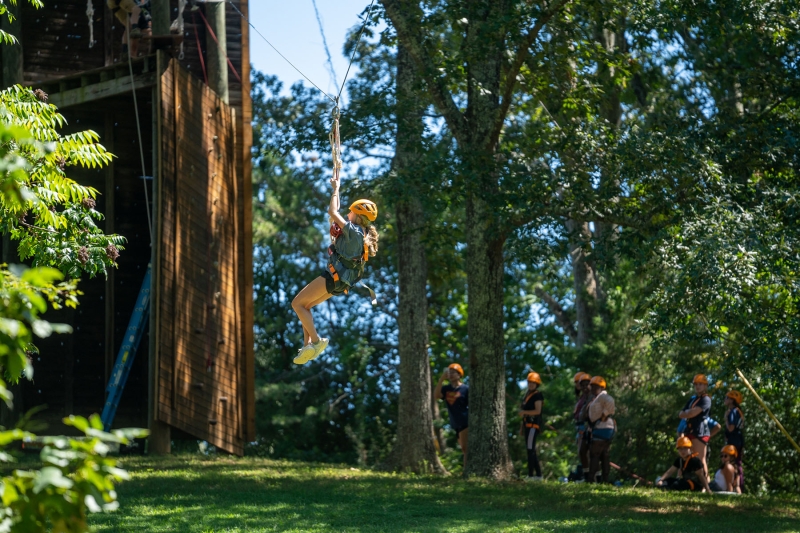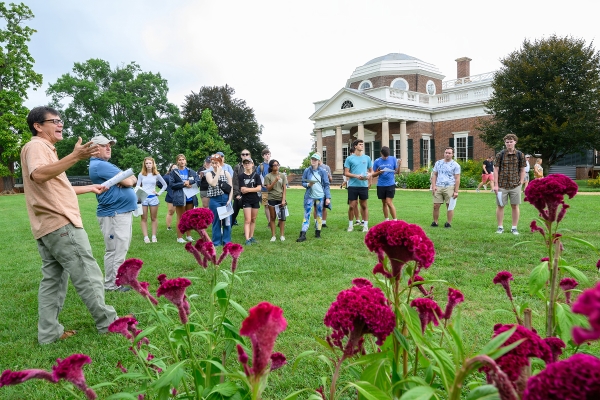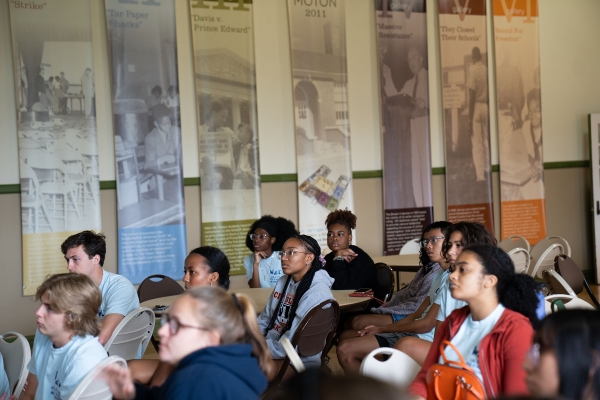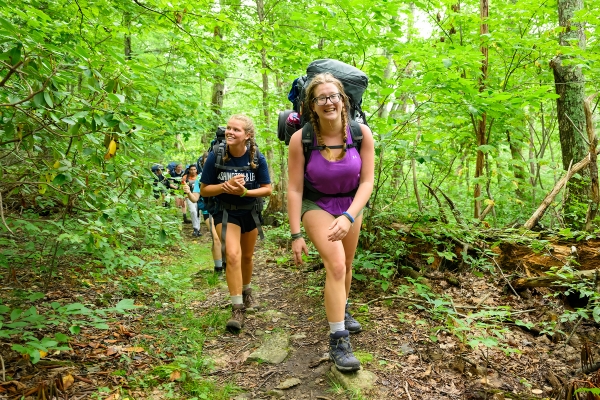Giving First-Year Students An Edge Washington and Lee's Leading Edge program welcomed the Class of 2027 to campus with dynamic programs designed to build community.
“It’s amazing to me how this program touches the whole community…Almost every piece of the W&L community is engaged in some way, and it’s really beautiful to see.”
~ Kim Hodge, assistant dean of students
Guided by upper-division trip leaders, the Leading Edge program provides first-year students with a welcoming introduction to the Washington and Lee community. It also offers an opportunity for the incoming students to have unique bonding experiences with their classmates before Fall Term begins. This year’s Leading Edge kicked off orientation with a variety of programs to choose from thanks to the faculty, staff and students, who gave the Class of 2027 a warm welcome.
First-years chose from 11 Leading Edge program tracks, including:
- Appalachian Adventure, which takes students backpacking along the Appalachian Trail
- Volunteer Venture, a service experience that offers both local and overnight trips
- From Queer to There: An LGBTQ+ History Tour co-led by Jake Reeves, assistant director of inclusion and engagement for LGBTQ+ support, and Sarah Horowitz, professor of history
- Wellness Adventure, in which students explore aspects of wellness such as time management, techniques for stress relief and other important skills for navigating their college experience
- Home Is Where The Art Is, a program designed to increase students’ awareness of the arts community on campus and familiarize them with spaces in the Lenfest Center for the Performing Arts; it also included a fieldtrip to a performance at the Kennedy Center in D.C.
- Browse the full list of offerings on the Leading Edge website.
Kim Hodge, assistant dean of students, coordinates Leading Edge. Hodge works with faculty, the Student Affairs division’s first-year team and partners across campus to create their individual Leading Edge offerings. She also guides the program toward its overarching goals and learning outcomes, and supports upper-division student involvement as trip leaders. Hodge said it has been an honor to see Leading Edge receive so much support from across the W&L community.
“We’ve been thoughtful about how to make this an introduction to W&L that builds community in inclusive ways,” Hodge said.
Programs are designed to allow students to explore their interests as they form a sense of community and lasting bonds with other members of their class. Program leader Sarah Horowitz said that one of the joys of the Leading Edge week—and the weeks of planning leading up to it—was the opportunity to connect with students before the term starts and set the stage for their W&L experience.
“This was an opportunity to do the thing I love about teaching early on in the academic year,” Horowitz said, “which is helping students get adjusted to and excited about academic life.”
Students who participated in the Freedom Ride experience will have the opportunity to attend a reunion event in January, where they can reconnect and meet upper-division students who previously participated in the program. Michael Hill said that this reunion event, as well as other programming through the DeLaney Center, is interwoven with conversations that students begin on the Freedom Ride.
“The Civil Rights Era was a season of transition in the life of a country, and the students participating in this program are also in a season of making a transition from high school to college,” Hill said. “Part of what we invite them to contemplate is how to move back and forth between individual goals and building community.”
Cami Knott ’27, a first-year from Chattanooga, Tennessee, participated in the Volunteer Venture experience in Greensboro, and said that connecting with the Freedom Ride students at the Historic Magnolia House was an impactful opportunity to reflect on her service work, activism and the connection between the two.
“It made me realize the power that we hold to make change, even as young as we are,” Knott said.
Leading Edge has expanded in recent years to offer a variety of substantive program choices for students. Three new trips—Wellness Adventure, Home Is Where the Art Is, and From Queer To There—were added this year to accommodate the entire first-year class. First-year athletes who were unable to participate in week-long programming due to their pre-seasons were invited to on-campus events including other Leading Edge trips, such as an outing to nearby Hull’s Drive-In, a presentation on W&L ghost stories and legends in Stackhouse Theater, and a Zumba class lead by Ronda Bryant, associate dean of students.
Ella Van Wyk ’27, a first-year from Eugene, Oregon, said she knew she wanted to participate in the Appalachian Adventure program right from her application to the university. Van Wyk’s group hiked south on the Appalachian Trail from a drop-off point near Peter’s Mountain, just north of Blacksburg, Virginia.
“I think Appalachian Adventure is such a great way of meeting people early on outside of the people you’re living with, the people that you’re going to take classes with—all different interests and backgrounds, but with a shared interest in hiking and backpacking,” Van Wyk said.
Van Wyk said W&L was the only university in her college search that offered a program like Leading Edge at no additional cost, an opportunity that is available for the first time this year. In 2021, the Board of Trustees voted to dedicate the earnings on $40 million of the university’s endowment to curricular and programmatic enhancements to the student experience. This commitment—along with the Class of 1997 Endowment for Pre-Orientation Programs and the Rogowski Endowment for Pre-Orientation Programs—has also allowed the university to upgrade equipment, such as camping supplies and trail essentials, that were previously a financial burden for some students. James Dick, director of outdoor education, said that having this equipment covered for each Appalachian Adventure participant is a huge program improvement.
“This ultimately makes for better experiences out on the trail for first-year students—experiences that even inspire them to come back and serve as trip leaders the following year,” Dick said.
For upper-division students, Leading Edge provides opportunities to practice responsible leadership and gain experience in team building and project management. Tyler Bush ’26, who served as trip leader for From Queer to There, said his experience helped him recognize his strengths.
“So much preparation went into this trip,” said Bush, “including reaching out to the trip members daily, making time to bond as a leadership team, and a lot of organization before the first-years arrived on campus.”
“For me, the highlight of the week was watching the students work in teams to create blueprints of their ideal sustainably developed communities in pre-existing cities,” said Bella Ferrate ’26, who served as a trip leader for the Sustainability program. “It was inspiring to watch how they drew on information they learned throughout the week, as well as information from their unique experiences and backgrounds, to create imaginative and realistic solutions for current issues.”
“It’s amazing to me how this program touches the whole community,” Hodge said. “We’ve seen lasting friendships formed between first-years, upper-division trip leaders return year after year, faculty and staff who continue to run the programs, and funding support from alumni and the Board of Trustees. Almost every piece of the W&L community is engaged in some way, and it’s really beautiful to see.”
If you know any W&L students who would be great profile subjects, tell us about them! Nominate them for a web profile.
 Participants in the Leading Edge Wellness Adventure program zipline at the Peaks in Thaxton, Virginia.
Participants in the Leading Edge Wellness Adventure program zipline at the Peaks in Thaxton, Virginia. Students on the Archaeology Leading Edge trip tour Thomas Jefferson’s Monticello.
Students on the Archaeology Leading Edge trip tour Thomas Jefferson’s Monticello. The Freedom Ride visiting the Moton Museum, a National Historic Landmark in Farmville, Virginia.
The Freedom Ride visiting the Moton Museum, a National Historic Landmark in Farmville, Virginia. Students on the Apple Orchard North App Adventure trip head into camp for the evening.
Students on the Apple Orchard North App Adventure trip head into camp for the evening.
You must be logged in to post a comment.